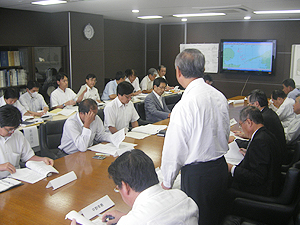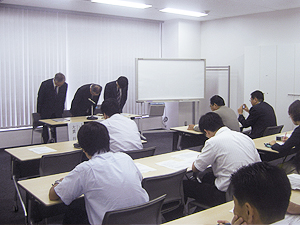Safety Measures
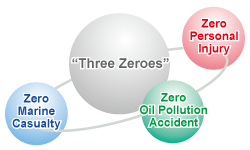
The basic philosophy at Daiichi Chuo Kisen encompasses safe navigation and environmental protection. In order to guarantee reliable navigation in the international maritime industry, we have adopted
"The 3 Zeros (Zero Personal Injury, Zero Marine Casualty, Zero Oil Pollution Accident)"
as our safety objectives. We have formalized the proprietary knowhow cultivated over many years and we have taken a range of measures to achieve the safety objectives.
Fleet Management at Daiichi Chuo Kisen
— Aiming to Improve Safety and Efficiency with Rigorous Fleet Management —
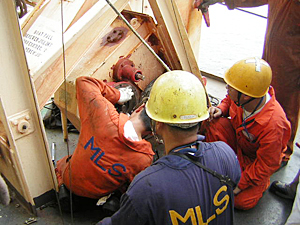
Over many years, the Daiichi Chuo Kisen Group has operated a broad array of ships, from inland and coastal vessels to large-scale raw material transports and VLCC. Based on proprietary know-how of fleet management cultivated over many years and the ISM Code (International Management Code for the Safe Operation of Ships and for Pollution Prevention) established by the International Maritime Organization (IMO), we have put together a proprietary DCKK Fleet Management System, and we carry out detailed fleet management covering both tangible and intangible aspects.
DCKK Fleet Management System
We pioneered the DCKK Fleet Management System in 1986 with the aim of improving environmental protection and operating efficiency and safely operating all ships owned and operated by the Company. With the addition of accident analysis, accident prevention measures and methods for evaluating on-board vessel inspections, we have worked to apply and further strengthen fleet management.
Outline of the DCKK Fleet Management System
- Objectives
Our objectives are to safely operate the Company fleet (all operational ships including company vessels, chartered ships, commissioned ships) and to improve environmental protection and operating efficiency. - Outline of Activities
- a) Accident Prevention Measures and Keeping Everyone Informed
We have produced a wide range of accident prevention plans and manuals including measures to prevent the collapse of cargo such as steel, plywood and lumber, a manual on navigating in icy waters, and a range of cargo conservation manuals. This material is distributed to prevent accidents. - b) On-board Inspections
We carry out on-board inspections of all ships in our fleet to check the hull, engine and equipment, to assess crew competency and the state of operations, and to provide guidance for safe navigation. - c) Safety Campaign in Winter Season
We regard the period from December to March as "Safety Campaign in Winter Season " because the weather becomes heavy and accidents dwe to heavy weather are worried. In this period, we make inportant objectives in every year and build the reinforcement activity to prevend the accidents. - d) Analyzing Operational Accidents
We strive for thorough accident prevention by aggregating all accidents at sea for the whole fleet on a monthly basis, analyzing trends in the accidents, and formulating the necessary measure to prevent accidents. - e) Fleet Performance Checks
Targeting the whole fleet, we carry out performance evaluations of each ship based on data in the navigational track record, on-board inspection reports and accident summaries. This forms the basis of improvement to operational efficiency.
- a) Accident Prevention Measures and Keeping Everyone Informed
Training for Foreign Crew Members
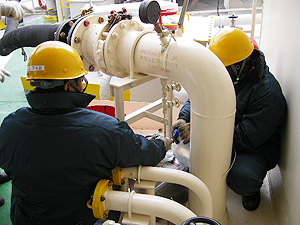
Safe navigational operation requires not only ships of good quality, but also a crew with superior knowledge and skills. In recent years, ocean-going shipping has entered a period when many foreign crew members jointly man the ships even if the ships themselves sail under the Japanese merchant flag. Ships under Japanese management are manned by many crew members from Asian countries, with the Philippines having a long history of providing foreign crew.
We established Maranaw Luzon Shipping Co., Inc. as a joint venture with a local crew recruiting company in Manila (The Philippines) in 1974, with a focus on retaining and training superior foreign crew.
Nowadays, foreign crew members form the core of the Maranaw crew, with the company supplying sailors from China, Myanmar, Vietnam, Bangladesh and South Korea. These sailors are also in charge of operating the fleet safely.
Because of differences in national characteristics, customs and educational standards, an extraordinary effort is required to keep up the skill level of the crew. As a result, we have formulated a proprietary curriculum that includes BRM training, Tanker and Gas Handling Simulation, Ship Handling Simulation, Deck Department/ Engine Department Seminars, and Pre-boarding Education. Training for key personnel is a given, but we also aim to improve the skills of all crew members through a meticulous responses such as carrying out training at appropriate overseas educational institutions, translation of manuals and guidance in every native language.
The foundation of our approach to safety is that we value "the person."
Marine Casualty Maneuvers
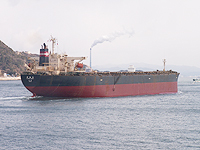
The Environmental Management System (=EMS) requires carrying out the maneuvers of the emergency measures once a year.
According to the above EMS, in Daiichi Chuo Kisen, Marine Casualty Maneuvers following Counter Measure is held by all the members, the President and other Directors, Executive Officers etc every year.
The purpose of this Marine Casualty Maneuvers is that to make sure of the internal and external information structures, the measure devised to all parties concerned and the news media.
